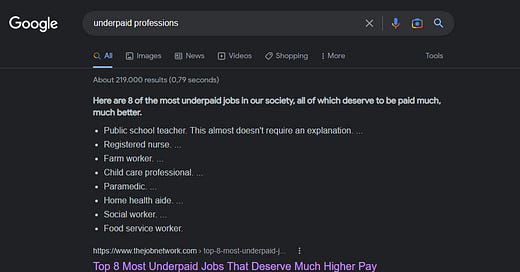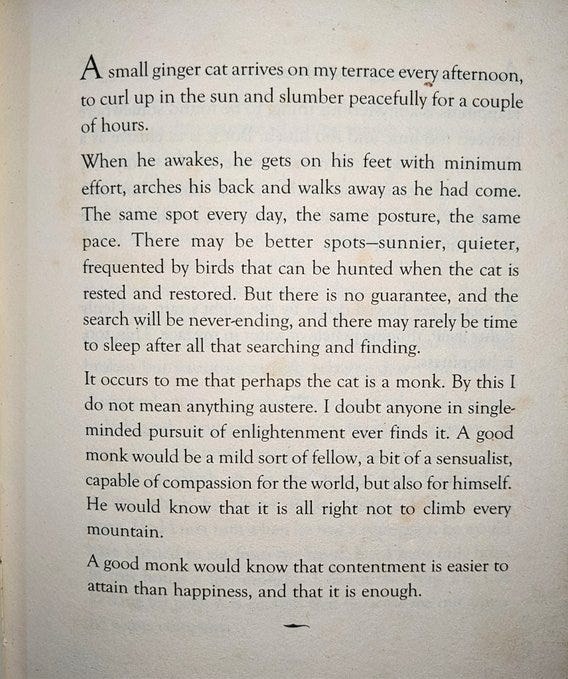People can't pour from an empty cup
Teachers, nurses, and social workers make up a section of professionals who deserve better pay and more respect than they get.
On airplanes, whenever they give you the security demonstration, they always say — please attend to yourself and put on your oxygen mask first. Then, take a moment to tend to another person (mostly a child or someone who can’t get to it themselves).
In life, the same principle applies. Or, well, it should.
Our society doesn’t seem to believe in the fact that those who take care of the world should enjoy (and are entitled to) respect, decent pay, and benefits — all the bare minimum when you take up a profession.
Shaping the next generation without decent pay or respect
Think about it for a second — teachers, nurses, and doctors (not the super-skilled surgeons and in-demand specialists, just your average junior doctor who takes care of your minor issues), are all service workers. They spend their time caring for your kids and loved ones during some of their most vulnerable moments.
Yet, teachers worldwide continue to be underpaid and often disrespected with stupid idioms like “Those who can’t do, teach.”
“[...] elementary and pre-school teachers across 34 developed countries make about 22% less, on average than their full-time counterparts with similar education levels who have chosen to do pretty much anything else with their lives.”
This stat is from 2015, and if you think things have changed, here’s the stat from 2022:
“In very few of the 19 countries and other participants with available data for at least one level of education do teachers’ actual salaries reach or exceed those of similarly educated workers. They amount to 65% or less of the earnings of similarly educated workers [...].”
Overall, teachers continue to be paid dust — both literally and metaphorically. And all this to say, we entrust teachers with shaping the next minds of our world, bringing to life a child’s imagination, and keeping them secure for nearly 5-8 hours a day from ages 3-18. But somehow, we can’t afford to pay them as much as we pay tech bros or professionals with similar qualifications.
Oddly, when asked, the public seems to think and agree that teachers should be paid more — they often expect that teachers are paid fairly, and that’s why they demand a good education. But that expectation rings hollow in the face of systemic disrespect and dismissal of teaching as a vocational career — it’s a choice, right? That’s the most commonly offered defence. Teachers choose to go into this career knowing it’s underpaid and understanding that they (maybe) get job satisfaction from working with children and getting paid to do what they might have otherwise done for free.
Here’s the thing about vocational careers or ‘callings’ — people can choose differently.
Teachers’ job satisfaction is at its lowest level in 50 years, with 42% of educators saying the stress of their job is worth it, compared to 81% in the 1970s.
Interest in the teaching profession among high school seniors and college freshman is at its lowest point in the last 50 years, dropping 50% since the 1990s and 38% since 2010.
Enjoying caring for others doesn’t solve burnout
Pink-collar workers like teachers, healthcare workers (especially nurses), and home aides have been grossly underpaid and mistreated for decades worldwide. Pink-collar work refers to care-oriented work that historically has been done by women. It’s also an excuse to underpay these professions as they’re considered “supplementary jobs” — apparently, people can’t run whole houses on these salaries, so why bother paying them properly, I guess?
Think back to March-April 2020 — when our governments decided that banging pots and pans across the country was the best way to show our gratitude to our healthcare workers. What if, instead of that cacophony, we figured out ways to give them pay raises and/or better working conditions?
My mom is a nurse, and several other close family members and friends are part of the healthcare industry in various professions. I’ve seen them pull triple shifts, screwing up their sleep schedules and health to take care of others — there’s an innate feeling of wanting to care for others in them, but how long can we take advantage of that?
For example, when the clocks went back a few weeks ago, most of us got an extra hour in bed/got to work an hour later. But healthcare workers on their shift didn’t get paid for that extra hour they put in.
If you make the case that they’ll get it back in the spring when the clocks go back (or front or whatever this malarkey is), it’s worth thinking about the fact that the same people are probably not gonna be on that shift.
Similarly, social workers — those who work with children, teenagers, and those abandoned by our society — are also overworked and underpaid. Enormous case-loads full of extremely emotional situations, people, and lives to figure out — and these aren’t professions you can completely switch off from when the clock strikes 5 pm.
Is it any surprise that people don’t want to choose such gruelling professions and instead prefer cushy jobs that allow them to negotiate benefits, higher pay, and an easier workday?
No one can pour from an empty cup continuously
As humans, we’ll all have a fuller cup and an emptier cup to pour from (read: help others) from time to time. But, when it comes to the people we want taking care of us, our kids, and our sickly loved ones, maybe we need to work to ensure their cups are not running low or empty all the time — as the case seems to be right now.
If we pay our teachers and nurses fairly and offer them the respect they deserve, they are less likely to seek second jobs, side hustles, and whatnot — all of which contribute to them showing a reduced effort in their day job.
After all, better-paid teachers, nurses, social workers, and other service workers would probably feel more motivated to do a better job than if they were being underpaid.
What did you think of this issue?
Your anonymous feedback helps me improve. Thanks!
If you liked this issue (or like the newsletter in general), feel free to buy me a coffee or two — or you can just share it somewhere!
Nia’s Newsletter Rec:
This newsletter is one of my all-time fave Sunday reads. Ali, a TV writer & yoga teacher, writes Little Things. Every Sunday, she sends out tv, film & book recommendations, writing tips, spiritual practices, an inspiring quote, and a question for you to ponder. I've noted down some of these questions to use in my year-end recap in my bullet journal & website.
Along with the roundups, Ali also writes occasional essays, interviews other creatives, and has cultivated an optimistic yet vulnerable space for artists who are also invested in their wellbeing. Her post on embracing the downs cycles in life encompasses what her newsletter is all about:
Things that have been on my mind this week:
I'm dealing with the loss of another family member, and in doing that, I've come to remember again that grief isn't linear or something you can completely move past. Not sure if I've already shared it, but here's my favourite way to think about grief — a ball in a box.
Some VERY comforting facts to think about when it feels like everything's going to hell.
Now that I've written about and shared so much on adult friendships, I seem to come across something new about it every week. What if we find it difficult to make friends in adulthood because we don't feel safe?
Last week, I shared a book recommendation on Reading Under The Radar.
Nifty Google Chrome extensions to make life a little easier (bionic reading is my fave).
I’m trying out Passionfroot to block slots for cross-promos & maybe ads/sponsorships in future issues. If you think you’d like to cross-promote, hmu here. Also, I will decline if I don’t think it’s a good fit for my readers so please don’t harbour any hard feelings about that!
I think a lot about making a choice between staying where you are, where you feel content and chasing higher levels of contentment and/or success. This excerpt from a Ruskin Bond book was really helpful & calming. I hope it does the same for you:
I’ll see you next week — maybe not at the same time, but definitely the same place.








Thank you so much for sharing the ball in a box grief analogy. What a wonderful way to illustrate grief. And it allows so much flexibility to encompass the different ways everyone grieves.
Take care.
As a teacher, I say yes to all of this. Teachers cannot be at their best when they are worried about making ends meet or working unreasonable hours to complete tasks for their job outside of school hours. Teachers need to be paid so they don't have to think about second jobs and side hustles and they need to have their work load lessened so they can do their job well AND have much needed personal lives. Our democracy and economy are dependent on educated human beings and it starts with a strong K-12 educational system.